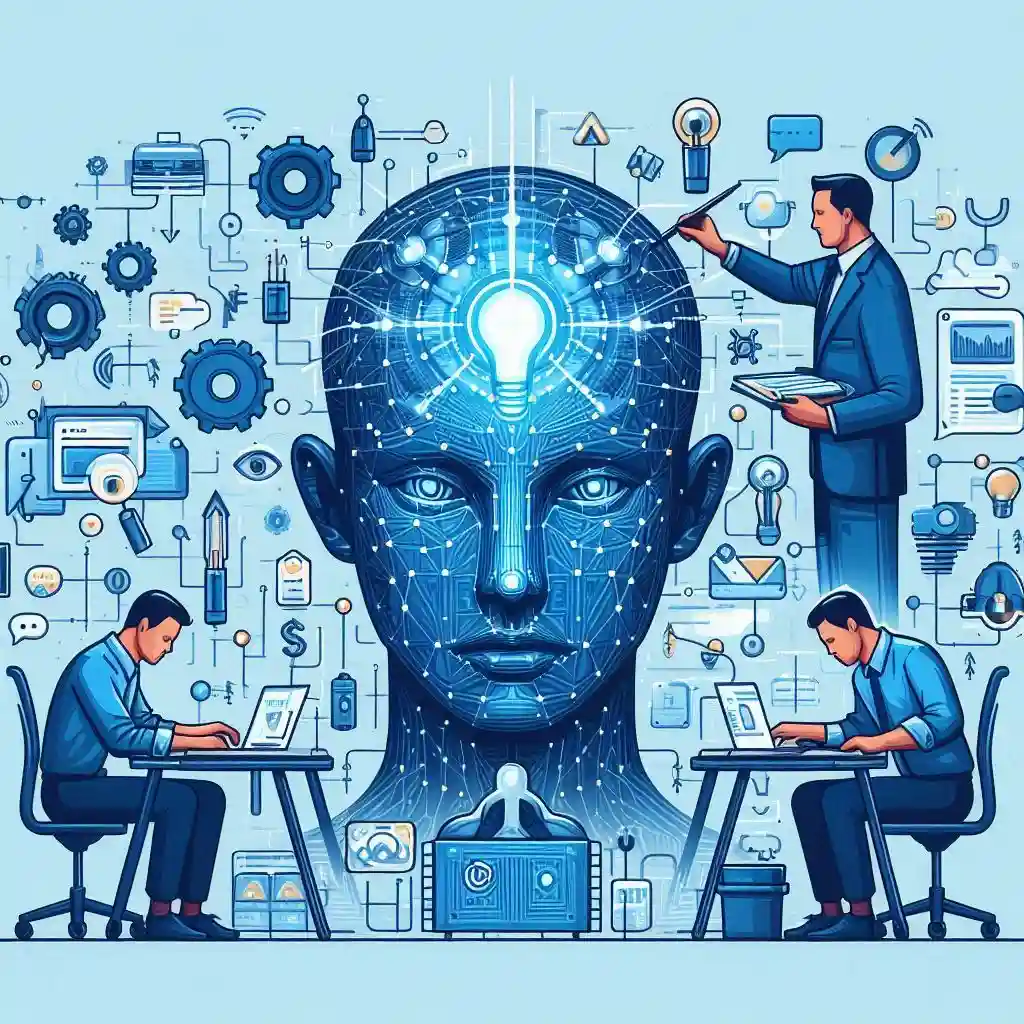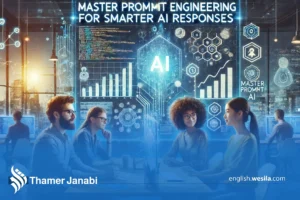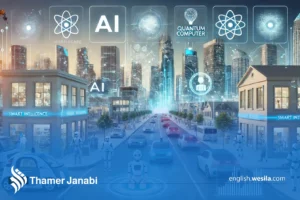Artificial Intelligence Trends You Need to Know in 2024
Discover the top artificial intelligence trends you need to know in 2024 and how they will transform industries, businesses, and daily life.

Table of Contents
Introduction
Artificial Intelligence (AI) is no longer a futuristic concept confined to science fiction. In 2024, AI permeates nearly every facet of modern life, from the way we work and communicate to the way we innovate and solve global challenges. As AI continues to evolve at an unprecedented pace, its impact is being felt across industries, economies, and personal experiences. This article explores the relevance of AI in 2024, examining its evolution, industry applications, and future possibilities.
Why Artificial Intelligence is More Relevant Than Ever in 2024
In 2024, AI is more than a technological advancement—it is a driving force behind digital transformation and innovation. With the integration of AI into critical sectors such as healthcare, finance, and education, its relevance grows exponentially. The exponential growth of data, improved computational power, and advances in machine learning have made AI indispensable. AI’s ability to learn, adapt, and make decisions at scale has shifted how businesses operate, how individuals engage with technology, and how society addresses complex problems.
The Evolution of Artificial Intelligence
A Brief History: How We Got Here
The journey of AI began decades ago with early theories of machine intelligence, but it wasn’t until the advent of advanced computing in the late 20th century that AI gained real momentum. The development of neural networks, machine learning algorithms, and natural language processing (NLP) in the 1980s and 1990s set the stage for AI’s current capabilities. Today, AI is underpinned by sophisticated algorithms capable of mimicking human thought processes, thanks to innovations in deep learning and autonomous systems.

Key Milestones Leading to 2024
Several key milestones have brought AI to its current state in 2024. The rise of cloud computing enabled scalable AI applications, while breakthroughs in neural networks and deep learning models, like GPT and BERT, revolutionized language processing. In 2023, AI-generated content reached new levels of sophistication, and autonomous systems became integral to sectors like transportation and logistics. These advancements have laid the groundwork for the widespread adoption of AI technologies.
AI’s Impact on Global Industries
How AI is Revolutionizing Healthcare
AI has become a transformative force in healthcare, where it enhances diagnostic accuracy, personalizes treatment plans, and accelerates drug discovery. Machine learning algorithms analyze vast datasets to identify patterns that humans might overlook, allowing for early detection of diseases such as cancer. In 2024, AI-powered tools are helping doctors make more informed decisions, reducing human error and improving patient outcomes.
The Future of AI in Finance: Predicting Trends and Risks
In the finance industry, AI has proven to be a powerful ally. By analyzing market data in real time, AI systems can predict trends, assess risks, and detect fraudulent activities with remarkable precision. As AI continues to evolve, its role in automating financial processes, from robo-advisors to algorithmic trading, is becoming more prevalent. In 2024, AI is expected to further streamline operations and drive new efficiencies across banking and investment sectors.
AI in Retail: Enhancing Customer Experience and Operations
Retailers are leveraging AI to revolutionize customer experiences and optimize supply chains. AI-driven personalization allows companies to tailor marketing strategies and product recommendations to individual consumers. In 2024, AI continues to power smart inventory systems, predictive analytics for consumer behavior, and chatbots that enhance customer service experiences.
AI’s Role in the Automotive Industry: Driving Innovation
AI is reshaping the automotive industry through advancements in autonomous driving technology, intelligent navigation, and predictive maintenance. AI-powered vehicles are equipped with sophisticated sensors and algorithms that allow them to perceive their environment, make decisions, and navigate roads safely. By 2024, AI is driving innovation not only in self-driving cars but also in the broader mobility ecosystem, including electric vehicles and smart transportation networks.
AI in Everyday Life
Smart Homes: AI in Home Automation
AI has made its way into everyday life, particularly in the form of smart home technologies. Devices like voice-activated assistants, smart thermostats, and automated lighting systems rely on AI to anticipate user needs and create seamless living environments. In 2024, smart homes are becoming more intuitive, with AI systems learning individual routines and optimizing energy usage.
AI-Enhanced Devices: From Smartphones to Wearables
From smartphones to wearable devices, AI is enhancing how we interact with technology. AI powers features like facial recognition, voice commands, and health tracking, making devices more personalized and responsive. As AI advances, these devices become more sophisticated, offering real-time health monitoring, fitness coaching, and even early detection of medical conditions.
How AI is Transforming Online Shopping
Online shopping has been revolutionized by AI through recommendation engines, personalized shopping experiences, and predictive analytics. In 2024, AI-driven virtual assistants guide shoppers through product selections, and AI-powered warehouses ensure faster and more accurate order fulfillment. AI’s ability to predict trends and optimize inventory management is also reshaping the logistics of e-commerce.
Emerging AI Technologies to Watch
The Rise of Generative AI: Beyond Human Creativity
Generative AI has moved beyond simple tasks to creative endeavors, producing art, music, and even entire articles. In 2024, this technology pushes the boundaries of creativity, offering novel solutions and content generation at a level once thought impossible for machines.
AI-Powered Robotics: From Factory Floors to Everyday Use
AI-powered robotics are revolutionizing industries from manufacturing to healthcare. In 2024, robots equipped with AI are not only performing repetitive tasks on factory floors but are also assisting in surgeries, rehabilitation, and eldercare. These robots are becoming increasingly autonomous, with the ability to adapt to their environments and interact with humans in meaningful ways.
Quantum Computing and AI: A Powerful Synergy
The intersection of AI and quantum computing promises to unlock new possibilities. Quantum computing’s ability to process complex problems at unprecedented speeds is accelerating AI development, especially in areas like cryptography and drug discovery. In 2024, this synergy is expected to push AI to new heights, solving problems that were previously beyond its reach.
AI and Data: The Growing Power of Predictive Analytics
How AI is Leveraging Big Data in 2024
AI thrives on data, and in 2024, the amount of data available for analysis is staggering. AI systems use this data to identify patterns, predict outcomes, and make informed decisions in real time. Big data combined with AI is enabling breakthroughs in fields such as healthcare, marketing, and logistics.
Personalized Experiences: AI’s Role in Customer Data Analysis
Personalization is the key to customer engagement, and AI plays a critical role in analyzing customer data to deliver tailored experiences. From targeted advertisements to customized product recommendations, AI systems in 2024 are leveraging data to build deeper connections between brands and consumers.
AI Ethics and Challenges
The Ethics of AI: Balancing Innovation with Responsibility
As AI becomes more pervasive, ethical concerns around its development and use are gaining importance. Balancing the benefits of AI with the responsibility to ensure transparency, fairness, and accountability is critical. In 2024, ongoing discussions about the ethical implications of AI focus on its potential to perpetuate bias, invade privacy, and impact job markets.
Addressing Bias in AI Systems: A Growing Concern
Bias in AI systems remains a pressing issue. As algorithms make decisions based on historical data, they risk perpetuating existing inequalities. By 2024, addressing bias in AI has become a key priority, with developers working to create more equitable systems and ensure that AI technologies do not reinforce harmful stereotypes or discriminate against vulnerable groups.
Data Privacy and Security in AI: Safeguarding the Future
As AI relies on massive amounts of personal data, ensuring privacy and security is paramount. In 2024, safeguarding sensitive information in AI systems is a top concern, with governments and organizations implementing stricter regulations to protect individuals’ data and prevent misuse.
The Role of AI in Sustainable Development
How AI is Tackling Climate Change
AI is playing a critical role in addressing global challenges such as climate change. From optimizing energy consumption to predicting environmental shifts, AI is helping to develop sustainable solutions. In 2024, AI-driven climate models and green technologies are key components in the fight to reduce carbon footprints and promote environmental resilience.
The Role of AI in Smart Cities and Urban Planning
Smart cities are harnessing AI to improve urban living. In 2024, AI is optimizing traffic flows, enhancing waste management, and making public services more efficient. AI’s role in urban planning is growing, with its ability to analyze complex data sets, predict population growth, and model sustainable city designs.
The Future of Work: AI’s Impact on Employment
AI in Automation: Jobs at Risk and Jobs of the Future
AI-driven automation is reshaping the workforce. While some jobs are at risk due to automation, new opportunities are emerging in AI development, data analysis, and other tech-driven fields. By 2024, industries are adapting to this new reality, with workers reskilling to meet the demands of the AI era.
Reskilling for the AI Era: How to Stay Relevant
As AI takes over routine tasks, reskilling has become essential for staying competitive in the job market. In 2024, educational institutions and companies are investing heavily in upskilling programs to equip workers with the knowledge needed to collaborate with AI technologies and thrive in an increasingly automated world.
AI in Education and Learning
AI-Powered Learning Tools: The Future of Education
AI is transforming education by creating personalized learning experiences and enhancing accessibility. In 2024, AI-powered platforms are revolutionizing how students learn, offering customized study plans, real-time feedback, and virtual tutors that adapt to individual learning styles.
How AI is Changing Skill Development and Online Learning
AI is also driving changes in skill development and online learning. In 2024, AI platforms offer more targeted, flexible learning opportunities, allowing individuals to acquire new skills at their own pace. These systems are helping to bridge skill gaps and prepare workers for the demands of an AI-driven economy.
The Role of Governments in AI Development
AI Regulations: Navigating Policy and Innovation
Governments are playing a crucial role in shaping the future of AI by creating regulations that promote innovation while protecting citizens’ rights. In 2024, AI policy frameworks are evolving to address ethical concerns, ensure data privacy, and promote responsible AI use.
How Governments are Using AI for Public Services
Governments are also leveraging AI to improve public services. In 2024, AI is being used to enhance law enforcement, streamline administrative processes, and provide better healthcare. These applications are increasing efficiency and transparency in government operations.
Key AI Trends to Look Out for in 2024
AI and Natural Language Processing: What’s Next
Natural Language Processing (NLP) has seen tremendous advances, and in 2024, AI systems are becoming even more adept at understanding and generating human language. The next phase of NLP is focused on creating AI systems that can engage in more natural, human-like conversations and interactions.
Edge AI: Taking AI Processing Closer to the Source
Edge AI is gaining traction as a solution to the limitations of centralized cloud computing. In 2024, processing AI tasks closer to the data source reduces latency, enhances privacy, and allows for faster decision-making in industries like autonomous vehicles and healthcare.
AI for Cybersecurity: The Next Frontier
Cybersecurity is becoming increasingly reliant on AI to detect and prevent threats in real time. In 2024, AI-powered systems are identifying patterns in cyberattacks and providing proactive defenses against ever-evolving digital threats.
Conclusion
Preparing for the AI-Driven Future in 2024 and Beyond
AI’s role in shaping the future is undeniable. As we continue to harness its power in 2024, we must also prepare for the challenges and opportunities it presents. By embracing AI’s potential, addressing ethical concerns, and focusing on sustainable development, we can ensure that AI drives positive change for both individuals and society as a whole. The future, powered by AI, is here—and it’s only just beginning.
FAQ
Why is artificial intelligence more relevant than ever in 2024?
AI is more relevant in 2024 due to its growing integration into industries, everyday life, and technological innovation. With advancements in machine learning, big data, and cloud computing, AI is now critical for improving business operations, enhancing consumer experiences, and solving global challenges like climate change and healthcare.
What are some key milestones that have brought AI to its current state in 2024?
Key milestones include the development of neural networks, deep learning, and natural language processing technologies. The rise of cloud computing and significant advancements in AI models like GPT and BERT have also fueled rapid AI development. By 2024, AI is being widely used for content generation, automation, and autonomous systems in industries such as automotive and healthcare.
How is AI revolutionizing healthcare in 2024?
AI is enhancing healthcare by improving diagnostic accuracy, personalizing treatment, and speeding up drug discovery. AI algorithms can analyze vast datasets to detect patterns, leading to earlier disease detection, better treatment plans, and improved patient outcomes.
What is the role of AI in finance?
In 2024, AI is used in finance for predicting market trends, assessing risks, automating processes like algorithmic trading, and preventing fraud. AI enhances decision-making capabilities and increases efficiency across financial institutions.
How is AI impacting the retail industry?
AI is transforming retail by providing personalized customer experiences through recommendation engines, optimizing supply chain operations, and improving inventory management. AI chatbots and virtual assistants are also enhancing customer service interactions.
What role does AI play in the automotive industry?
AI drives innovation in the automotive sector through advancements in autonomous vehicles, intelligent navigation systems, and predictive maintenance. AI-powered vehicles can analyze their surroundings, make decisions, and ensure safer driving conditions.
What is Generative AI, and why is it important in 2024?
Generative AI refers to AI systems capable of creating content such as text, music, or art. By 2024, generative AI is pushing the boundaries of human creativity, enabling the creation of novel solutions and ideas that were previously beyond machine capabilities.
What is the synergy between AI and quantum computing?
Quantum computing’s ability to process massive and complex problems at incredible speeds is accelerating AI’s potential. By 2024, quantum computing and AI are working together to solve previously unsolvable problems, particularly in cryptography and drug discovery.
How is AI leveraging big data in 2024?
AI is using big data to identify trends, predict outcomes, and make informed decisions in real time. With the massive amounts of data generated daily, AI analyzes this data to create actionable insights, helping industries optimize processes and strategies.
What are the ethical challenges of AI in 2024?
Ethical concerns around AI in 2024 include ensuring transparency, fairness, and responsibility in its deployment. Issues like bias in AI systems, data privacy, and the ethical use of AI in automation and decision-making processes are key topics of discussion.
How is bias being addressed in AI systems?
Addressing bias is critical as AI systems can inadvertently perpetuate existing societal biases. By 2024, AI developers are working to create more equitable algorithms that do not reinforce harmful stereotypes or discriminate based on gender, race, or other factors.
What is the role of AI in combating climate change?
AI is used to tackle climate change by optimizing energy use, predicting environmental shifts, and modeling climate scenarios. AI-driven technologies help reduce carbon emissions and improve sustainability efforts globally.
How does AI affect the future of work?
AI is reshaping the workforce by automating routine tasks while also creating new job opportunities in AI development and data science. By 2024, reskilling and upskilling workers is essential for adapting to the demands of AI-powered automation.
What are AI-powered learning tools, and how are they transforming education?
AI-powered learning tools in 2024 provide personalized educational experiences. These tools adapt to individual learning styles, offer real-time feedback, and enhance accessibility for learners globally, making education more efficient and tailored.
What role do governments play in AI development?
Governments are responsible for regulating AI development to ensure ethical use, data privacy, and fair practices. They also leverage AI in public services, such as healthcare, law enforcement, and administrative processes, to improve efficiency.
What are some key AI trends to watch in 2024?
Key trends include advancements in natural language processing (NLP), edge AI (processing data closer to the source), and AI for cybersecurity. These trends are expected to drive significant change in industries ranging from communication to digital security.
What is edge AI, and why is it important?
Edge AI processes data locally on devices rather than relying on cloud computing, reducing latency and enhancing privacy. In 2024, it is used in applications like autonomous vehicles and healthcare systems, where real-time decision-making is critical.
How is AI improving cybersecurity in 2024?
AI is enhancing cybersecurity by detecting and responding to threats in real time. AI systems can identify patterns in cyberattacks, providing proactive defense mechanisms against evolving digital threats.
What can individuals and businesses do to prepare for the AI-driven future in 2024?
To prepare for the AI-driven future, individuals should focus on reskilling in areas such as AI, data science, and machine learning. Businesses must embrace AI to drive innovation, improve efficiency, and stay competitive in a rapidly changing digital landscape.
For more information about Artificial Intelligence click here
To visit the website of wesila click here





